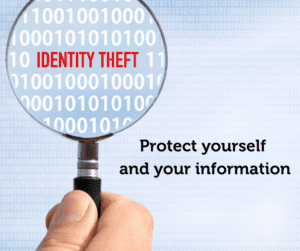With the new year comes new reminders for ways to protect your financial wellbeing. Scammers are very adept at finding out information about your personal life that could provide clues to your financial life as well. They can use online, telephone, and email as effective ways to get information from or about you that could end up costing you peace of mind.
There is certainly no shortage of opportunities for thieves to extract information from your online profile or posts so be aware of everything you put on social media—or better yet just avoid it when possible.
You’ve probably seen (or maybe even participated in) some of the popular “polls” on Facebook that offer entertaining distractions like your Elf Name for simply inserting your father’s middle name, the street you grew up on, and the month you were born. Notice anything suspicious about those qualifying questions? Yes, they’re often the same security questions you fill out when signing up for a credit card or other online offer. Talented scammers can use that information to help confirm your identity and take calculated guesses at your security questions and/or passwords. It’s best to just ignore those opportunities and forego the desire to discover your Soap Opera character!
Charity scams are very popular right now given the state of the economy and the ongoing impacts of the global pandemic. Make sure you check out the charity or the cause you’re being solicited to help. Many are legitimate, many others are not. Learn how to identify and protect yourself at https://www.fbi.gov/scams-and-safety/common-scams-and-crimes/charity-and-disaster-fraud
Elders are often victims of cyber and other scams because they are frequently less technology savvy and often feel shame and embarrassment making them less likely to report an incident.
If you’re ever in doubt that you might be being swindled, assume you are and seek the counsel of your financial advisor or other trusted resource. For example, never give out your social security number, account number or any other confidential personal information to any caller or in any email or text message. Keep this information in a secure location in your home especially if you have outside services such as cleaning people or care givers coming into your home. Never leave bank or investment statements out where visitors can see them.
If you believe you’ve been the victim of a cyber scam, you can file a complaint at https://www.ic3.gov/Home/ComplaintChoice/default.aspx
It is hard to keep track of all of the different types of scams. And there seem to be new ones that criminals come up with every day.
To learn more about the characteristics and methods of different types of scams, visit https://www.fbi.gov/scams-and-safety/common-scams-and-crimes.
The FBI also offers information on cyber crimes and things you can do to help protect yourself and your financial well-being at https://www.fbi.gov/investigate/cyber






